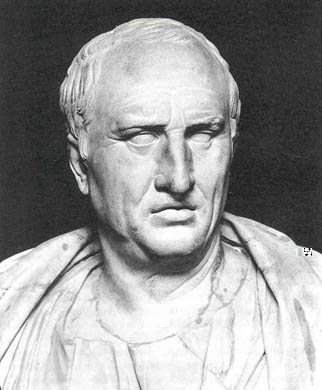As they become more political, however, think tanks — especially the newer and more advocacy-oriented institutions founded in the past decade or so — risk becoming both more conventional and less valuable. At a moment when we have too much noise in politics and too few constructive ideas, these institutions may simply become part of the intellectual echo chamber of our politics, rather than providing alternative sources of policy analysis and intellectual innovation.
Tevi Troy
Th' newspaper does ivrything f'r us. It runs th' polis foorce an' th' banks, commands th' milishy, controls th' ligislachure, baptizes th' young, marries th' foolish, comforts th' afflicted, afflicts th' comfortable, buries th' dead an' roasts thim aftherward.
Finley Peter Dunne"Newspaper Publicity" in Observations by Mr. Dooley
 |
| Cato |
Tevi Troy in an article in National Affairs suggests that while Washington Think Tanks have "come to play a central role in policy development" since World War II, in recent years they have been much more involved in political combat. We know that most people, including many policy makers, have a tendency to seek out things supportive of their beliefs rather than to seek the best independent evidence, whether that evidence challenges or supports their beliefs; people are more likely to seek arguments to bolster their preconceptions than to accept arguments that challenge their ideologically based positions.
Scientific institutions, in contrast, seek experimental evidence that tests their hypotheses, demand replication of observations and "double blinds" to assure that preference does not affect observation, and demand peer review (preferably by peers with a number of viewpoints) to challenge their beliefs. The greatest prestige in science goes to those who successfully overturn a paradigm. Think tanks should institutionalize similar approaches to policy analysis. They should not serve as script writers for politicians, developing arguments to support the position of the day. (There are enough places doing that already.)
On the other hand, scientists are notoriously ineffective in communicating science to the public and to their governments. Such failure to communicate would seem to be deadly for think tanks which are intended to influence policy.
The issue is how to combine strong policy analysis with strong communication, and to do that communication in ways that will influence the minds of policy makers. Not an easy challenge to which to rise.
No comments:
Post a Comment